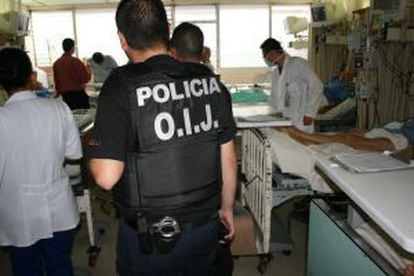How Costa Rica became the center of global human-organ trafficking ring
One couple offered $20,000 to donate a kidney for a transplant in Israel, statement claims

An Israeli company offered to pay a Costa Rican woman $20,000 to purchase her left kidney and a doctor reportedly paid for flights for the transplant to be carried out in March 2013, she and her husband said in a sworn statement.
The statement, which was recently obtained by EL PAÍS, was part of an investigation that broke last year with the arrests of a number of people, including four doctors, who were allegedly part of a ring that also involved co-conspirators in several Eastern European nations.
The case is similar to one recently uncovered in Spain in which authorities arrested a wealthy 61-year-old Lebanese man who had offered to pay a reported €40,000 to a migrant woman for a section of her liver. Police made five other arrests in Valencia and charged them with being part of a group that recruited needy illegal migrants willing to sell their vital organs for transplants. Such practices are illegal in Spain.
The Costa Rican couple, who are from Cartago province, gave their sworn statement on March 18 at a detention center in Tel Aviv’s Ben Gurion airport before consulate officials from their country. Investigators had been working on the case since as early as 2009. The Mexico City daily El Universal was first to report the details last May.
Between June and October of last year, Costa Rican prosecutors arrested four doctors, identified by their last names – Mora, Mauro, Fonseca and Monge – along with a police officer by the name of Cordero and a businessman known as Katisgiannis, and charged them with being part of the international conspiracy. Mora is considered the ring leader of the group, while the police officer and businessman acted as recruiters, authorities said.
The suspects were part of a group based in Israel that moved large amounts of cash and, within the past few years, used Costa Rica as its base to seek out people, prosecutors said.
Their hands were covered in blood but filled with money”
The case is still under investigation even though several of those arrested are out on bail.
“Their hands were covered in blood but filled with money,” said one of the prosecutors in the investigation, Carlos María Jiménez.
The World Health Organization estimates that about 10 percent of the 100,000 transplants carried out each year around the world involved illegal human organ trafficking.
The Costa Rican couple’s sworn statement blew open the secrecy surrounding the organ-trafficking business in the Central American nation. According to the pair, the negotiations were carried out from 2012 at the Calderón Guardia Hospital in the capital, San Jose, which is considered one of the leading publicly run medical centers in the country.
Mora “warned us not to discuss anything we talked about, the kidney transplant or, of course, the money he was going to give us,” the couple said in their statement, which they gave to authorities on “their own free will” and “under oath.”
They came to meet the doctor in May 2012 through other people who had sold their organs, the couple said. After Mora took a blood sample from the woman, he promised her $20,000 for her left kidney but said that payment would be made by “an alleged Israeli firm.”
According to the statement, Mora conducted various medical tests to determine the compatibility of the woman’s kidney – all paid for by the physician. “Dr Mora negotiated the payment of the round-trip airline fares but did not give us any name to contact in that country or any money to pay for our stay,” they said.
They were stopped by Israeli immigration officials upon their arrival at Tel Aviv. Authorities believed that they were trying to enter the country illegally to seek work.
After the busts, the Legislative Assembly began looking at ways to put an end to the trafficking of human organs in the country and at the beginning of March passed a law imposing stricter sanctions against anyone participating in such crimes.










































